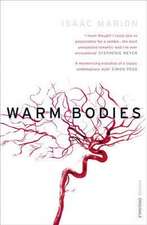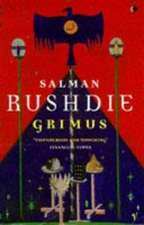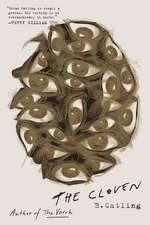The Alteration: New York Review Books (Paperback)
Autor Kingsley Amis William Gibsonen Limba Engleză Paperback – 6 mai 2013
How Hubert realizes what lies in store for him and how he deals with the whirlpool of piety, menace, terror, and passion that he soon finds himself in are the subject of a classic piece of counterfactual fiction equal to Philip K. Dick’s The Man in the High Castle.
The Alteration won the John W. Campbell Memorial Award for best science-fiction novel in 1976.
Din seria New York Review Books (Paperback)
-
 Preț: 89.90 lei
Preț: 89.90 lei -
 Preț: 83.87 lei
Preț: 83.87 lei -
 Preț: 133.15 lei
Preț: 133.15 lei -
 Preț: 87.81 lei
Preț: 87.81 lei -
 Preț: 114.58 lei
Preț: 114.58 lei -
 Preț: 114.52 lei
Preț: 114.52 lei -
 Preț: 106.32 lei
Preț: 106.32 lei -
 Preț: 62.56 lei
Preț: 62.56 lei -
 Preț: 89.68 lei
Preț: 89.68 lei -
 Preț: 81.74 lei
Preț: 81.74 lei -
 Preț: 175.91 lei
Preț: 175.91 lei -
 Preț: 134.72 lei
Preț: 134.72 lei -
 Preț: 105.30 lei
Preț: 105.30 lei -
 Preț: 106.83 lei
Preț: 106.83 lei -
 Preț: 92.77 lei
Preț: 92.77 lei -
 Preț: 95.05 lei
Preț: 95.05 lei -
 Preț: 100.59 lei
Preț: 100.59 lei -
 Preț: 105.81 lei
Preț: 105.81 lei -
 Preț: 82.93 lei
Preț: 82.93 lei -
 Preț: 97.50 lei
Preț: 97.50 lei -
 Preț: 106.94 lei
Preț: 106.94 lei -
 Preț: 89.68 lei
Preț: 89.68 lei -
 Preț: 146.50 lei
Preț: 146.50 lei -
 Preț: 109.10 lei
Preț: 109.10 lei -
 Preț: 115.05 lei
Preț: 115.05 lei -
 Preț: 92.18 lei
Preț: 92.18 lei -
 Preț: 88.45 lei
Preț: 88.45 lei -
 Preț: 76.50 lei
Preț: 76.50 lei - 35%
 Preț: 65.54 lei
Preț: 65.54 lei - 38%
 Preț: 70.32 lei
Preț: 70.32 lei
Preț: 101.21 lei
Nou
Puncte Express: 152
Preț estimativ în valută:
19.37€ • 21.03$ • 16.27£
19.37€ • 21.03$ • 16.27£
Carte indisponibilă temporar
Doresc să fiu notificat când acest titlu va fi disponibil:
Se trimite...
Preluare comenzi: 021 569.72.76
Specificații
ISBN-13: 9781590176177
ISBN-10: 1590176170
Pagini: 231
Dimensiuni: 130 x 203 x 15 mm
Greutate: 0.25 kg
Editura: NEW YORK REVIEW OF BOOKS
Seria New York Review Books (Paperback)
ISBN-10: 1590176170
Pagini: 231
Dimensiuni: 130 x 203 x 15 mm
Greutate: 0.25 kg
Editura: NEW YORK REVIEW OF BOOKS
Seria New York Review Books (Paperback)
Notă biografică
Kingsley Amis (1922ߝ1995) was a popular and prolific British novelist, poet, and critic, widely regarded as one of the greatest satirical writers of the twentieth century. Born in suburban South London, the only child of a clerk in the office of the mustard-maker Colman’s, he went to the City of London School on the Thames before winning an English scholarship to St. John’s College, Oxford, where he began a lifelong friendship with fellow student Philip Larkin. Following service in the British Army’s Royal Corps of Signals during World War II , he completed his degree and joined the faculty at the University College of Swansea in Wales. Lucky Jim, his first novel, appeared in 1954 to great acclaim and won a Somerset Maugham Award. Amis spent a year as a visiting fellow in the creative writing department of Princeton University and in 1961 became a fellow at Peterhouse College, Cambridge, but resigned the position two years later, lamenting the incompatibility of writing and teaching (“I found myself fit for nothing much more exacting than playing the gramophone after three supervisions a day”). Ultimately he published twenty-four novels, including science fiction and a James Bond sequel; more than a dozen collections of poetry, short stories, and literary criticism; restaurant reviews and three books about drinking; political pamphlets and a memoir; and more. Amis received the Booker Prize for his novel The Old Devils in 1986 and was knighted by Queen Elizabeth II in 1990. He had three children, among them the novelist Martin Amis, with his first wife, Hilary Anne Bardwell, from whom he was divorced in 1965. After his second, eighteen-year marriage to the novelist Elizabeth Jane Howard ended in 1983, he lived in a London house with his first wife and her third husband.
William Gibson is the author of many novels, including Neuromancer and Pattern Recognition. His collected essays and articles have been published under the title Distrust That Particular Flavor.
William Gibson is the author of many novels, including Neuromancer and Pattern Recognition. His collected essays and articles have been published under the title Distrust That Particular Flavor.
Extras
1
Hubert Anvil's voice rose above the sound of the choir and full orchestra, reaching the vertex of the loftiest dome in the Old World and the western doors of the longest nave in Christendom. For this was the Cathedral Basilica of St George at Coverley, the mother church of all England and of the English Empire overseas. That bright May afternoon it was as full as it had ever been in the three centuries since its consecration, and it could scarcely have held a more distinguished assembly at any time: the young King William V himself; the kings of Portugal, of Naples, of Sweden, of Lithuania and a dozen other realms; the Crown Prince of Muscovy and the Dauphin; the brother of the Emperor of Almaigne; the viceroys of India, New Spain and Brazil; the High Christian Delegate of the Sultan-Calif of Turkey; the Vicar-General of the Emperor-Patriarch of Candia; the incumbent Archbishop of Canterbury, Primate of United England; no fewer than twelve cardinals, together with less pre-eminent clergy from all over the Catholic world- these and thousands besides had congregated for the laying to rest of His Most Devout Majesty, King Stephen III of England and her Empire.
He had been a good king, worthy of his distinction in matters of faith and observances, enjoying mutually respectful relations with both Convocation and the Papal Cure, held in tender affection by the people. A large number of those attending his Requiem Mass would have been moved as much by a sense of personal loss as by simple duty or the desire to assist at a great occasion. Just as many, perhaps, were put in awe by the size and richness of the setting. Apart from Wren's magnificent dome, the most renowned of the sights to be seen was the vast Turner ceiling in commemoration of the Holy Victory, the fruit of four and a half years' virtually uninterrupted work; there was nothing like it anywhere. The western window by Gainsborough, beginning to blaze now as the sun first caught it, showed the birth of St Helena, mother of Constantine the Great, at Colchester. Along the south wall ran Blake's still brilliant frescoes depicting St Augustine's progress through England. Holman Hunt's oil-painting of the martyrdom of St George was less celebrated for its merits than for the tale of the artist's journey to Palestine in the hope of securing authenticity for his setting; and one of the latest additions, the Ecce Homo mosaic by David Hackney, had attracted downright adverse criticism for its excessively traditionalist, almost archaizing style. But only admiration had ever attended—to take a diverse selection-the William Morris spandrels on the transept arches, the unique chryselephantine pyx, the gift of an archbishop of Zululand, above the high altar, and Epstone’s massive marble Pietà.
To all but the tone-deaf, the music must have been more immediate than any or all of these objects: Mozart's Second Requiem (K.878), the crown of his middle age and perhaps of all his choral work. Singers and musicians had just entered upon the Agnus Dei. There was a story about this too, that it had been written out of the composer's grief at the untimely death of an esteemed and beloved younger contemporary, but its celestial plangency needed no such eking-out. From its home key of D minor the piece moved through the relative major into the G minor section for solo voice and orchestra. With its long runs and jagged melodic line it made great demands on the singer, but Hubert Anvil was more than equal to them, hitting every note in the middle, moving from top to bottom of the wide tessitura with no loss of tone or power. Throughout the huge congregation all were motionless, and remained so when the section came to a close and the choir was heard again.
Some stayed still because they felt they should rather than from artistic or pious feeling. Two such were the aged representatives of the Holy Office in their black vestments symbolically piped in scarlet: Monsignor Henricus and Monsignor Lavrentius, or, to give them the familiar names by which they were known in their native Almaigne and Muscovy, Himmler and Beria. Not far from them, a third man held himself rigid out of a desire not to give the smallest grounds for offence to those many of his neighbours who made no attempt to conceal from him their often hostile curiosity. The Archpresbyter of Arnoldstown was the first holder of his office ever to have crossed the threshold of St George's, and there was some resentment at the admission of a Schismatic eminence—in plainer terms, a surplice heretic—to today's ceremony. At his side, Cornelius van den Haag, New Englander Ambassador to the court of St Giles, had become too far immersed in the music to stir.
For Federicus Mirabilis and Lupigradus Viaventosa, what they were now listening to was a significant part of their entire reason for attendance. Mirabilis's eyes were open, though they saw nothing; Viaventosa's were lightly shut, with a tear showing at the corner of each. Both men knew Mozart's masterpiece by heart and had the skill to remove from consciousness the woodwind decorations, the solemn brass chords, the throb of the kettledrums, the surge of the strings. All that the two heeded was Hubert Anvil's performance. Neither relaxed or moved until it was complete, until the supremely difficult solo flourish in the coda had been accomplished, until indeed the final bar had passed and, at the end of some seconds of total silence, a great rustle and clearing of throats filled the nave. Then Mirabilis turned and looked questioningly at his companion. After wiping away his tears, Viaventosa nodded his head slightly several times.
Outside the basilica, thousands of the people waited in the extensive paved square formed by its western face, the archiepiscopal palace opposite and, to the north and south, the Chapter House and the offices and residences of the Archdeacon, the Dean, the Vicar-Choral and other functionaries. These thousands had come not only from Coverley itself, but from as far away as London or even the cities of the northern shires, most of them by waggon, those who could afford it by railtrack or express-omnibus. They were the early arrivals, and they waited not only for a sight of royal, ecclesiastical and noble magnificence, but also for the Archbishop's benediction, which those other thousands, now lining the way to Headington Palace, must to their spiritual hardship go without.
The sun shone down, illuminating to advantage the rather severe stone facciata of the Chapter-House, pleasantly warming the multitude, which would, however, have assembled just the same in a snowstorm. On a different sort of grand occasion—a royal wedding, an anniversary of the Holy Victory—there would have been noise and bustle and trafficking, fiddlers, jugglers, acrobats, comedians, balladiers, vendors of hot patties and ginger beer, sharpers and pickpockets too. If there were any such here today, they were not plying their trade, but stood quietly alongside the worthy men who worked in the fields, forests and mines, in the provision of food, drink, clothing or furniture, in domestic service and in that profusion and variety of humbler lay offices required by the Church. When, as expected, Great Dick began to toll, indicating that King Stephen now lay at rest among his forefathers in the cathedral vaults, a groan of grief ran through the crowd and subsided. Again they settled down to wait, until the tall bronze doors of the basilica slowly opened.
At a dignified pace, the members of the congregation began to emerge and to take up their preordained places along the broad marble steps. Above them, the sculptured figures of Vanbrugh's tympanum, a boldly inventive representation of St George and the Dragon, caught the sunlight here and there, and above everything soared the twin Brunel spires, each of them overtopping by several feet that of Ulm Cathedral in Almaigne. The Archbishop ascended his tribunal popular, but it would be some minutes yet before all were in position to receive his blessing. His snow-white vicuna pallium, and beneath it the chasuble of black velvet adorned with gold, were an emblem of the austerity to be seen almost everywhere on this day. The Royal Palatine Guard in their azure and violet, together with the carmine uniforms and capotes of the Papal Cohort, provided the only patches of vivid colour. None could be found among the people, nothing but the dullest tones of moleskin, corduroy or hessian.
The Benediction Popular as an established Church practice was a comparatively recent innovation, dating back little more than three centuries. It was not confined to the English Isles, but flourished also in the Netherlands, in Brunswick-Brandenburg and in other northern states of Almaigne. To the learned, it symbolized the union between the two degrees of divine favour the Twice-Blessed, in the persons of those who had received the Benediction Devotional at the conclusion of the Mass, and the Once-Blessed as represented by those who filled the square; so also the union of the two conditions of society. But to the unschooled of the lower degree and the lower condition, it was one of the most important of the very few ways in which grace could be acquired by an act of will, since it was effective upon those in a state of sin.
The Archbishop proceeded to deliver his blessing. He spoke in high ecclesiastical Latin, a language unintelligible to the great body of his hearers despite the theoretical similarity of some of its forms to phrases they heard every day. But this did not matter to them, any more than it mattered to many of those present that His Eminence's voice reached them as a faint murmur, or to very many more that they heard nothing of it whatever. To be present meant to be within sight of the source of benediction; all that was required besides was to think seriously upon Jesus Christ; on these points doctrine was firm.
The ceremony reached its end. The Arch bishop vacated the tribunal, received the King's obeisance, raised him to his feet and escorted him to the royal baruch. In continuing silence—there would be no trumpets today—His Majesty took his seat, but the wheels did not turn until His Eminence was settled in the carriage immediately to the rear. The declining sun drew glaring reflections of itself from the gold leaf of both vehicles, fast-shifting points of varicoloured light from the cut crystal with which they Were embellished. Preceded by two Papal outriders, a troop of the Palatine Guard, their black-pennoned lances dipped, moved at a slow walk before the line of baruches, each drawn by blackplumed horses and hung with black streamers. Hooves, iron tires and harness made the only sounds. In the year of Our Lord one thousand nine hundred and seventy-six, Christendom would see nothing more mournful or more stately.
Hubert Anvil's voice rose above the sound of the choir and full orchestra, reaching the vertex of the loftiest dome in the Old World and the western doors of the longest nave in Christendom. For this was the Cathedral Basilica of St George at Coverley, the mother church of all England and of the English Empire overseas. That bright May afternoon it was as full as it had ever been in the three centuries since its consecration, and it could scarcely have held a more distinguished assembly at any time: the young King William V himself; the kings of Portugal, of Naples, of Sweden, of Lithuania and a dozen other realms; the Crown Prince of Muscovy and the Dauphin; the brother of the Emperor of Almaigne; the viceroys of India, New Spain and Brazil; the High Christian Delegate of the Sultan-Calif of Turkey; the Vicar-General of the Emperor-Patriarch of Candia; the incumbent Archbishop of Canterbury, Primate of United England; no fewer than twelve cardinals, together with less pre-eminent clergy from all over the Catholic world- these and thousands besides had congregated for the laying to rest of His Most Devout Majesty, King Stephen III of England and her Empire.
He had been a good king, worthy of his distinction in matters of faith and observances, enjoying mutually respectful relations with both Convocation and the Papal Cure, held in tender affection by the people. A large number of those attending his Requiem Mass would have been moved as much by a sense of personal loss as by simple duty or the desire to assist at a great occasion. Just as many, perhaps, were put in awe by the size and richness of the setting. Apart from Wren's magnificent dome, the most renowned of the sights to be seen was the vast Turner ceiling in commemoration of the Holy Victory, the fruit of four and a half years' virtually uninterrupted work; there was nothing like it anywhere. The western window by Gainsborough, beginning to blaze now as the sun first caught it, showed the birth of St Helena, mother of Constantine the Great, at Colchester. Along the south wall ran Blake's still brilliant frescoes depicting St Augustine's progress through England. Holman Hunt's oil-painting of the martyrdom of St George was less celebrated for its merits than for the tale of the artist's journey to Palestine in the hope of securing authenticity for his setting; and one of the latest additions, the Ecce Homo mosaic by David Hackney, had attracted downright adverse criticism for its excessively traditionalist, almost archaizing style. But only admiration had ever attended—to take a diverse selection-the William Morris spandrels on the transept arches, the unique chryselephantine pyx, the gift of an archbishop of Zululand, above the high altar, and Epstone’s massive marble Pietà.
To all but the tone-deaf, the music must have been more immediate than any or all of these objects: Mozart's Second Requiem (K.878), the crown of his middle age and perhaps of all his choral work. Singers and musicians had just entered upon the Agnus Dei. There was a story about this too, that it had been written out of the composer's grief at the untimely death of an esteemed and beloved younger contemporary, but its celestial plangency needed no such eking-out. From its home key of D minor the piece moved through the relative major into the G minor section for solo voice and orchestra. With its long runs and jagged melodic line it made great demands on the singer, but Hubert Anvil was more than equal to them, hitting every note in the middle, moving from top to bottom of the wide tessitura with no loss of tone or power. Throughout the huge congregation all were motionless, and remained so when the section came to a close and the choir was heard again.
Some stayed still because they felt they should rather than from artistic or pious feeling. Two such were the aged representatives of the Holy Office in their black vestments symbolically piped in scarlet: Monsignor Henricus and Monsignor Lavrentius, or, to give them the familiar names by which they were known in their native Almaigne and Muscovy, Himmler and Beria. Not far from them, a third man held himself rigid out of a desire not to give the smallest grounds for offence to those many of his neighbours who made no attempt to conceal from him their often hostile curiosity. The Archpresbyter of Arnoldstown was the first holder of his office ever to have crossed the threshold of St George's, and there was some resentment at the admission of a Schismatic eminence—in plainer terms, a surplice heretic—to today's ceremony. At his side, Cornelius van den Haag, New Englander Ambassador to the court of St Giles, had become too far immersed in the music to stir.
For Federicus Mirabilis and Lupigradus Viaventosa, what they were now listening to was a significant part of their entire reason for attendance. Mirabilis's eyes were open, though they saw nothing; Viaventosa's were lightly shut, with a tear showing at the corner of each. Both men knew Mozart's masterpiece by heart and had the skill to remove from consciousness the woodwind decorations, the solemn brass chords, the throb of the kettledrums, the surge of the strings. All that the two heeded was Hubert Anvil's performance. Neither relaxed or moved until it was complete, until the supremely difficult solo flourish in the coda had been accomplished, until indeed the final bar had passed and, at the end of some seconds of total silence, a great rustle and clearing of throats filled the nave. Then Mirabilis turned and looked questioningly at his companion. After wiping away his tears, Viaventosa nodded his head slightly several times.
Outside the basilica, thousands of the people waited in the extensive paved square formed by its western face, the archiepiscopal palace opposite and, to the north and south, the Chapter House and the offices and residences of the Archdeacon, the Dean, the Vicar-Choral and other functionaries. These thousands had come not only from Coverley itself, but from as far away as London or even the cities of the northern shires, most of them by waggon, those who could afford it by railtrack or express-omnibus. They were the early arrivals, and they waited not only for a sight of royal, ecclesiastical and noble magnificence, but also for the Archbishop's benediction, which those other thousands, now lining the way to Headington Palace, must to their spiritual hardship go without.
The sun shone down, illuminating to advantage the rather severe stone facciata of the Chapter-House, pleasantly warming the multitude, which would, however, have assembled just the same in a snowstorm. On a different sort of grand occasion—a royal wedding, an anniversary of the Holy Victory—there would have been noise and bustle and trafficking, fiddlers, jugglers, acrobats, comedians, balladiers, vendors of hot patties and ginger beer, sharpers and pickpockets too. If there were any such here today, they were not plying their trade, but stood quietly alongside the worthy men who worked in the fields, forests and mines, in the provision of food, drink, clothing or furniture, in domestic service and in that profusion and variety of humbler lay offices required by the Church. When, as expected, Great Dick began to toll, indicating that King Stephen now lay at rest among his forefathers in the cathedral vaults, a groan of grief ran through the crowd and subsided. Again they settled down to wait, until the tall bronze doors of the basilica slowly opened.
At a dignified pace, the members of the congregation began to emerge and to take up their preordained places along the broad marble steps. Above them, the sculptured figures of Vanbrugh's tympanum, a boldly inventive representation of St George and the Dragon, caught the sunlight here and there, and above everything soared the twin Brunel spires, each of them overtopping by several feet that of Ulm Cathedral in Almaigne. The Archbishop ascended his tribunal popular, but it would be some minutes yet before all were in position to receive his blessing. His snow-white vicuna pallium, and beneath it the chasuble of black velvet adorned with gold, were an emblem of the austerity to be seen almost everywhere on this day. The Royal Palatine Guard in their azure and violet, together with the carmine uniforms and capotes of the Papal Cohort, provided the only patches of vivid colour. None could be found among the people, nothing but the dullest tones of moleskin, corduroy or hessian.
The Benediction Popular as an established Church practice was a comparatively recent innovation, dating back little more than three centuries. It was not confined to the English Isles, but flourished also in the Netherlands, in Brunswick-Brandenburg and in other northern states of Almaigne. To the learned, it symbolized the union between the two degrees of divine favour the Twice-Blessed, in the persons of those who had received the Benediction Devotional at the conclusion of the Mass, and the Once-Blessed as represented by those who filled the square; so also the union of the two conditions of society. But to the unschooled of the lower degree and the lower condition, it was one of the most important of the very few ways in which grace could be acquired by an act of will, since it was effective upon those in a state of sin.
The Archbishop proceeded to deliver his blessing. He spoke in high ecclesiastical Latin, a language unintelligible to the great body of his hearers despite the theoretical similarity of some of its forms to phrases they heard every day. But this did not matter to them, any more than it mattered to many of those present that His Eminence's voice reached them as a faint murmur, or to very many more that they heard nothing of it whatever. To be present meant to be within sight of the source of benediction; all that was required besides was to think seriously upon Jesus Christ; on these points doctrine was firm.
The ceremony reached its end. The Arch bishop vacated the tribunal, received the King's obeisance, raised him to his feet and escorted him to the royal baruch. In continuing silence—there would be no trumpets today—His Majesty took his seat, but the wheels did not turn until His Eminence was settled in the carriage immediately to the rear. The declining sun drew glaring reflections of itself from the gold leaf of both vehicles, fast-shifting points of varicoloured light from the cut crystal with which they Were embellished. Preceded by two Papal outriders, a troop of the Palatine Guard, their black-pennoned lances dipped, moved at a slow walk before the line of baruches, each drawn by blackplumed horses and hung with black streamers. Hooves, iron tires and harness made the only sounds. In the year of Our Lord one thousand nine hundred and seventy-six, Christendom would see nothing more mournful or more stately.
Recenzii
“Buoyantly inventive from its ground-plan to its remotest pinnacles and twirly bits, Kingsley Amis’s new novel has almost nothing expectable about it, except that it is a study of tyranny.” —John Carey, New Statesman
"One of the best—possibly the best—alternate-worlds novels in existence." —Philip K. Dick
“The Green Man and The Alteration will retain their important places in the history of supernatural fiction and science fiction.” —Michael Dirda
“In one of his funniest novels, The Alteration, Kingsley Amis imagined a counterfactual world in which the Reformation had failed. Martin Luther had not plunged northern Europe into religious revolt, but instead became Pope Germanicus I. Prince Arthur of England did not die, so his odious brother Henry never became king. Henry's malcontent Protestant followers, after an abortive rebellion, were banished to New England, where they eventually invented free trade, electricity and personal hygiene. So Europe in the 1960s groaned under a papistical Haps burg tyranny. Harold Wilson was pope, dispensing tea in the Vatican ('Shall we be mother?'), and papal scouts combed English cathedrals for likely singing boys who, after suitable surgery ('The Alteration'), became castrati in the Sistine Chapel choir.” —Eamon Duffy, Sunday Times (UK)
“Amis, not content with writing scholarly treatments of the subject, produced a historical/futurological novel, The Alteration…I might add that the subject of sex in this work is introduced in the most radical and subversive way, though without the smallest hint of the pornographic.” —Christopher Hitchens, The Atlantic Monthly
"One of the best—possibly the best—alternate-worlds novels in existence." —Philip K. Dick
“The Green Man and The Alteration will retain their important places in the history of supernatural fiction and science fiction.” —Michael Dirda
“In one of his funniest novels, The Alteration, Kingsley Amis imagined a counterfactual world in which the Reformation had failed. Martin Luther had not plunged northern Europe into religious revolt, but instead became Pope Germanicus I. Prince Arthur of England did not die, so his odious brother Henry never became king. Henry's malcontent Protestant followers, after an abortive rebellion, were banished to New England, where they eventually invented free trade, electricity and personal hygiene. So Europe in the 1960s groaned under a papistical Haps burg tyranny. Harold Wilson was pope, dispensing tea in the Vatican ('Shall we be mother?'), and papal scouts combed English cathedrals for likely singing boys who, after suitable surgery ('The Alteration'), became castrati in the Sistine Chapel choir.” —Eamon Duffy, Sunday Times (UK)
“Amis, not content with writing scholarly treatments of the subject, produced a historical/futurological novel, The Alteration…I might add that the subject of sex in this work is introduced in the most radical and subversive way, though without the smallest hint of the pornographic.” —Christopher Hitchens, The Atlantic Monthly
Descriere
Descriere de la o altă ediție sau format:
Hubert Anvil is a 10 year old boy blessed with the voice of an angel. The Church hierarchy decrees that Hubert should be turned into a castrato - an alteration that could bring Hubert fame and fortune, but would also cut him off from an adult world he is curious to discover.
Hubert Anvil is a 10 year old boy blessed with the voice of an angel. The Church hierarchy decrees that Hubert should be turned into a castrato - an alteration that could bring Hubert fame and fortune, but would also cut him off from an adult world he is curious to discover.


















